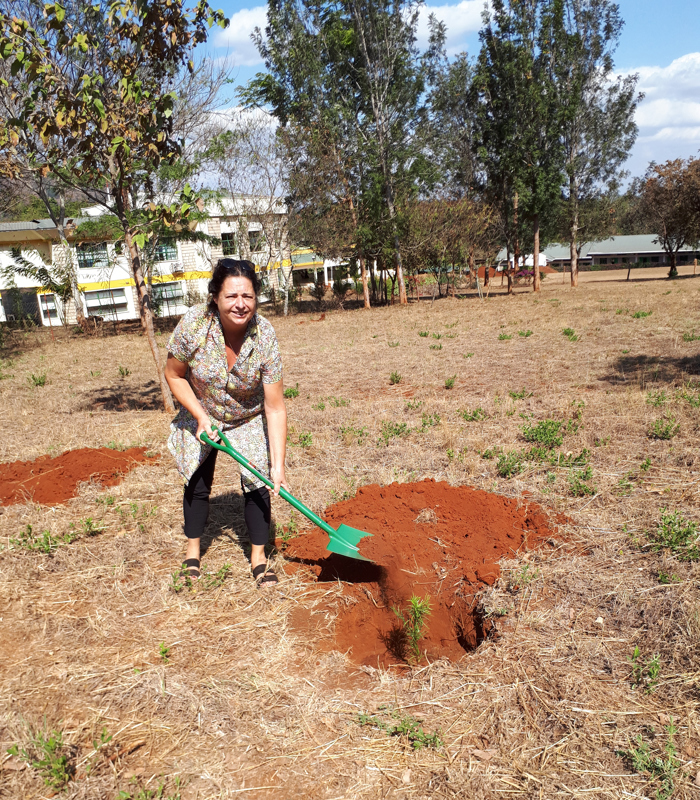According to the Dean of Meru University of Science and Technology (MUST) Professor Romanus, the effects of climate change are highly visible in Kenya. That's why he encourages every visitor to his institute to plant a tree. HAS University of Applied Sciences now has a tree there too.
HAS University of Applied Sciences is one of the Dutch educational institutions involved in the Kenyan project 'Enhancing Partnerships for Industry-led Vocational training and education (ePIVOT) in the horticulture value chains of Kenya'. The aim of this project, which runs until the end of 2021 and is subsidised by the Orange Knowledge Program, is to strengthen education and training in secondary and higher education and in vocational schools, so that there’s a better connection between education and the professional field. “This development is necessary to help deal with the consequences of the climate change that will have a major impact in the country in the coming years,” explains lecturer Marjo Baeten, who is managing the project from HAS University of Applied Sciences. “If you look at the UN Sustainable Development Goals, the project contributes mainly towards Food & Nutrition Security (SDG2) and Water (SDG6).”
Knowledge of the educational system
Marjo continues: “HAS University of Applied Sciences is focussing mainly on the joint development of a new curriculum at the educational institutions. Together with the Kenyan partners, we will also be looking for ways to map out developments in the labour market and to develop new curricula in collaboration with representatives from the sector. The new curriculum will be based on and respond to the needs of the labour market. We are also getting the sector more closely involved in education. This is currently not at all the case in Kenyan schools. So, we’re supporting them in making this change. The aim is to provide a better educated and better suited workforce.”
Developing at a tremendous rate
And this is really needed. Marjo: “Not only is Kenya a country that is developing at a tremendous rate, it is also facing the challenges resulting from climate change. For example, drought on the one hand, and floods on the other. The local agricultural sector must find a way to deal with this. They’re already working on it, but there’s great demand for well-trained professionals with the right knowledge and experience. In addition to helping with curriculum development, we’ll also be exchanging a great deal of experience with the other partners. And we can also learn a lot from them too.”
Smooth mission
At the beginning of this academic year, the partners in the project went on a first mission to Kenya, to further develop the programme. Marjo also joined them. “Such missions don't always run smoothly,” she points out, “especially when there are a lot of different partners involved. It can sometimes be difficult to achieve concrete results. But in this case, it didn’t take long for us all to get on well together. The different areas of expertise combined automatically. In addition to the four Dutch green institutes of higher education and the government, there were also education partners and representatives from industry involved. “Of course, the programme had been defined in general terms beforehand, but we did make quite a lot of adjustments on the spot, to make it better suited to the local conditions.”
Learning from each other
The aim of the project is for the Kenyan partners to do the work themselves and ask for support where necessary. “As far as HAS University of Applied Sciences is concerned, this means that lecturers will visit Kenya twice during the course of the project. The rest of the support will be digital, such as Skype and collaboration internet sites.” What Marjo likes about the project is the interaction between the parties. “Not only are the Kenyans learning from us, but we’re also learning from them: for example, how they are able to significantly reduce the use of water with very basic solutions. And I’m bringing this knowledge and experience back into the education at HAS.”
Partners
Meru University of Science and Technology (MUST)
Kenyan School of Agriculture
Wageningen Centre for Development Innovation of Wageningen University & Research (WCDI)
University of Applied Sciences Van Hall Larenstein
Aeres University of Applied Sciences
MoAF&I
Horticultural Crops Directory (HCD)




